
Upcoming Events
Past Events
The second edition of the Hydrogen Grand Challenge once again asked University of Michigan students to develop innovative business cases for Michigan-centered, regional deployment of hydrogen technology in key sectors such as transportation and industrial applications.
Competition Structure
Teams competed for a share of the $10,000 prize pool, with the first-place team receiving $5,000, the first runner-up awarded $3,000, and the second runner-up receiving $2,000.
The second challenge consisted of two phases:
- Workshop Training Phase (January–March 2025): Participants engaged in workshops, accessed expert resources, and received mentorship to refine their ideas and developed a strong business case.
- Final Pitch (April 10, 2025): Teams presented their business cases to a panel of judges, simulating a real-world pitch for venture capital funding. Winners were selected based on the strength of their idea, technical analysis, and go-to-market strategy.
Stored and Geologic Hydrogen: How Michigan’s Geological Foundations Underpin its Energy Transition in the 21st Century - 2/28/2025
Stored and Geologic Hydrogen: How Michigan’s Geological Foundations Underpin its Energy Transition in the 21st Century
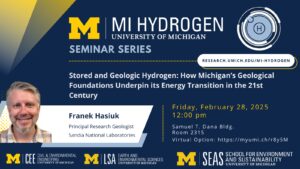
Franek Hasiuk, Principal Research Geologist at Sandia National Laboratories
Friday, February 28, 2025 | 12:00 pm | Samuel T. Dana Bldg. Room 2315
Underground hydrogen storage systems are the largest-scale, longest-term energy storage systems we can currently engineer. They have been proposed as integral parts of balancing supply and demand for electricity in electricity grids with variable power production systems like wind and solar, as well as supporting large-scale production of chemicals like ammonia (a major feedstock of agricultural fertilizers). This presentation will discuss the major types of underground hydrogen storage and their use cases. It will discuss how underground hydrogen storage can support development of naturally occurring hydrogen resources (so-called “geologic hydrogen”). And it will explain how underground hydrogen storage could be integrated into Michigan’s energy ecosystem as a function of its geological assets.
Bio: Dr. Franek Hasiuk is a Principal Research Geologist at Sandia National Laboratories, where he applies his skills in the geochemical and petrophysical analysis of rocks to various projects in subsurface energy storage and reservoir management. Franek (rhymes with sonic) earned a BS in Geology (with honors) and BA in Greek and Latin from the University of Iowa. He earned an MS and PhD from the University of Michigan in carbonate geochemistry. His professional career has included ExxonMobil Upstream Research, Iowa State University, and the Kansas Geological Survey. Now at Sandia, Franek works on a variety of projects related to geologic and stored hydrogen, nuclear waste, geothermal, lithium, carbon capture/use/storage, salt, and road building materials. The through-going theme is the need to turn rocks or fluids into numbers and then figure out how best to propagate those numbers across a geological model. He is the past president of the Energy Minerals Division of AAPG and a member of the University of Michigan Department of Earth and Environmental Sciences Alumni Advisory Board, also known as UMDEE-SAAB. Of all his professional accomplishments, he is proudest of his students the most.
New Horizons in Clean Hydrogen Production Technologies for a Sustainable Future - 1/24/2025
New Horizons in Clean Hydrogen Production Technologies for a Sustainable Future

Ibrahim Dincer, Professor of Mechanical and Manufacturing Engineering at Ontario Tech University
Virtual Event | Friday, January 24, 2025 at 12:00 pm
Since we are in the hydrogen age, it is critically important to develop clean hydrogen production technologies to achieve carbon neutral goals. This presentation will explore a range of clean hydrogen production technologies, highlighting both renewable and non-renewable methods. We will also discuss the challenges, opportunities and future directions in the field.
Bio: Ibrahim Dincer is a full professor of Mechanical Engineering at Ontario Tech. University and director in its Clean Energy Research Laboratory. Renowned for his pioneering works in the area of sustainable energy technologies, he has authored/co-authored many books and book chapters, along with many refereed journal and conference papers. Dr. Dincer has chaired many national and international conferences, symposia, workshops and technical meetings and has delivered numerous keynotes and invited lectures.
Dr. Dincer is an active member of numerous international scientific organizations and societies, and serves as editor-in-chief, associate editor, regional editor and editorial board member on various prestigious international journals. Over the past 10 years, he has been recognized by Thomson Reuters as one of the “Most Influential Scientific Minds in Engineering” and one of the most highly cited researchers. Over the past 25 years, Dr. Dincer’s research and activities have been diverse, but have primarily focused on sustainable energy solutions, sustainable communities and cities, district energy systems, green buildings, renewable energy technologies, energy storage technologies, hydrogen energy technologies and waste to energy technologies. His group has developed various novel technologies for commercialization. He is also known for his informative engineering education-related talks as a committed educator.
Growing Production Capacity in PEM Electrolysis: Learnings and Technical Accomplishments - 9/26/2024
Growing Production Capacity in PEM Electrolysis: Learnings and Technical Accomplishments
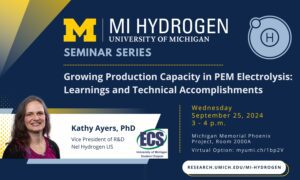
Co-sponsored with the ECS University of Michigan Student Chapter
Date and Time : Wednesday, September 25, 2024 | 3:00 pm – 4:00pm
Location: Michigan Phoenix Project, Room 2000A
Virtual Option: https://myumi.ch/1bp2V
Development of hydrogen production capacity with low carbon intensity (low carbon dioxide emissions) is an essential part of reaching global sustainability targets and mitigating long term climate change. While electrolysis has been commercial for decades, many applications have been smaller scale, and only a small fraction of the total hydrogen production is made from water rather than methane. It is therefore essential that PEM developers scale manufacturing capacity of cell stacks significantly in the next few years. This talk will discuss Nel’s stack scale up journey, and the fundamental technology challenges in transitioning research and development into manufacturing at scale.
Bio:
Dr. Kathy Ayers is Vice President of R&D for Nel Hydrogen US, with responsibility for developing and executing Nel’s technology strategy in proton exchange membrane electrolysis. She received her Ph.D. in Chemistry at Caltech, and spent several years in the battery industry before joining Nel in 2007. Dr. Ayers manages a broad portfolio of internally and externally funded research projects, across a range of collaborators in academia, industry, and National Labs. She is also the lead principal investigator for low temperature water splitting on the US Department of Energy benchmarking program, with the goal of providing protocols and standards for consistency in water splitting research.
Dr. Ayers has served on multiple scientific advisory boards for Energy Frontier Research Centers and similar consortia, as well as two Federal level advisory committees for DOE: HTAC (Hydrogen and Fuel Cells Technical Advisory Committee), and BESAC (Basic Energy Sciences Advisory Committee). She received R&D Awards at the 2012 and 2021 DOE Merit Reviews from the HFTO Production Team, and an American Chemical Society Rising Stars Award in 2014 from the Women Chemists Committee. She became a Fellow of the Electrochemical Society in 2020 and received the inaugural Walter van Schalkwijk award in 2022.
Building Foundations for the Hydrogen Economy - 5/13/2024
Building Foundations for the Hydrogen Economy

On 13 May 2024, MI Hydrogen hosted the “State of Michigan Workshop: Building Foundations for the Hydrogen Economy” to gather interested parties from across the state to identify and further advance potential near- and long-term hydrogen deployment opportunities and recommend key enabling actions. Learn More!
EVENT AGENDA
9:00 am – 9:10 am: Welcome and Logistics (Gregory Keoleian and Todd Allen, Co-Directors of MI Hydrogen)
9:10 am – 9:20 am: Opening Remarks (House Representative Haley Stevens)
9:20 am – 9:30 am: State of Michigan Update (Zach Kolodin, Chief Infrastructure Officer of the State of Michigan Infrastructure Office)
9:30 am – 9:50 am: Role of Hydrogen in Sustainable Transportation: Ground, Air, and Marine (Timothy Wallington/Joaquim Martins, University of Michigan)
9:50 am – 10:05 am: Moderated Discussion with Panelists (Joe Mercurio, GM; Tim Slusser, City of Detroit)
10:05 am – 10:15 am: Open Discussion with Audience Inputs
10:15 am – 10:30 am: Break
10:30 am – 10:50 am: Role of Hydrogen in Decarbonizing the U.S. Industrial Sector (Daniel Cooper/Yongxian Zhu, University of Michigan)
10:50 am – 11:05 am: Moderated Discussion with Industry Panelists (David Ingram, Fortescue)
11:05 am – 11:15 am: Open Discussion with Audience Inputs
11:15-am – 11:35 am: State of Michigan Hydrogen Demand Analysis: Current (2022), Near-term (2030), and Long-term (2050) (Stephen Lipshaw/Sara Murphy, University of Michigan)
11:35 am – 11:45 am: Open Discussion with Audience Inputs
11:45 am – 12:00 pm: Open Discussion with Audience Inputs on the Entire Morning
12:00 pm – 1:00 pm: Lunch with 30-minute MachH2 Hub update (Michigan Projects) (Charlie Tyson/Kevin Mehren, Michigan Infrastructure Office; Corwin Matthews, Flint Mass Transportation Authority; Reuben Sarkar, American Center for Mobility)
1:00 pm – 1:45 pm: 5-minute Industrial Perspective Lightning
-
- Neal Dreisig, Consumers Energy
- David Ingram, Fortescue
- Chris Kondogiani, Noble Gas Systems
- Christopher Mosser, Bennett Pump Company
- Mohammad Fatouraie, Bosch
- Invited: Plastic Omnium
1:45 pm – 2:00 pm: Closing Comments
2:00 pm – 3:00 pm: Additional Networking for growing the hydrogen ecosystem in MI
3:30 pm – 4:30 pm: Lab Tours (Optional)
Midwest Alliance For Clean Hydrogen (MachH2) Overview - 4/12/2024
Midwest Alliance For Clean Hydrogen (MachH2) Overview

Short Abstract:
Investment in Clean Hydrogen has reached an unprecedented scale in the United States. The U.S. Department of Energy (DOE) through the Department of Clean Energy Demonstrations (OCED) has formulated a Regional Clean Hydrogen Hubs Program which includes up to $7 billion to establish seven regional clean hydrogen hubs across America. As part of the Bipartisan Infrastructure Law, the H2Hubs will form the foundation of a national clean hydrogen network that will contribute substantially to decarbonizing multiple sectors of the economy including heavy industries and heavy-duty transportation. The Midwest Alliance for Clean Hydrogen (MachH2) with proposed activities in Michigan, Indiana and Illinois is one of the seven hubs invited to enter negotiations with the DOE. This presentation will give an overview of the H2 Hubs program and envisioned activities of MachH2.
Bio:
Neil Banwart, CFA
Chief Integration Officer, MachH2
As Chief Integration Officer, Neil Banwart’s responsibilities include ensuring MachH2 maximizes all sources of funding and also working to continually expand the reach and impact of MachH2. In conjunction with the CEO, he also represents MachH2 in public facing matters such as media interviews, on panels, and at tradeshows.
Neil also serves as Managing Director-Hydrogen at Energy Systems Network (ESN). Prior to ESN, he spent nearly a decade at Cummins Inc. He has held several M&A, Treasury, and finance roles in his career, including service as the CFO of a small private equity fund. Neil earned a Bachelor’s in Finance from the University of Illinois at Urbana-Champaign and an MBA from Bradley University. He is a CFA Charterholder and serves on the Board of Directors of the CFA Society of Indianapolis as the immediate past president.
First Competition: Michigan Hydrogen Horizon - 4/11/2024
First Competition: Michigan Hydrogen Horizon

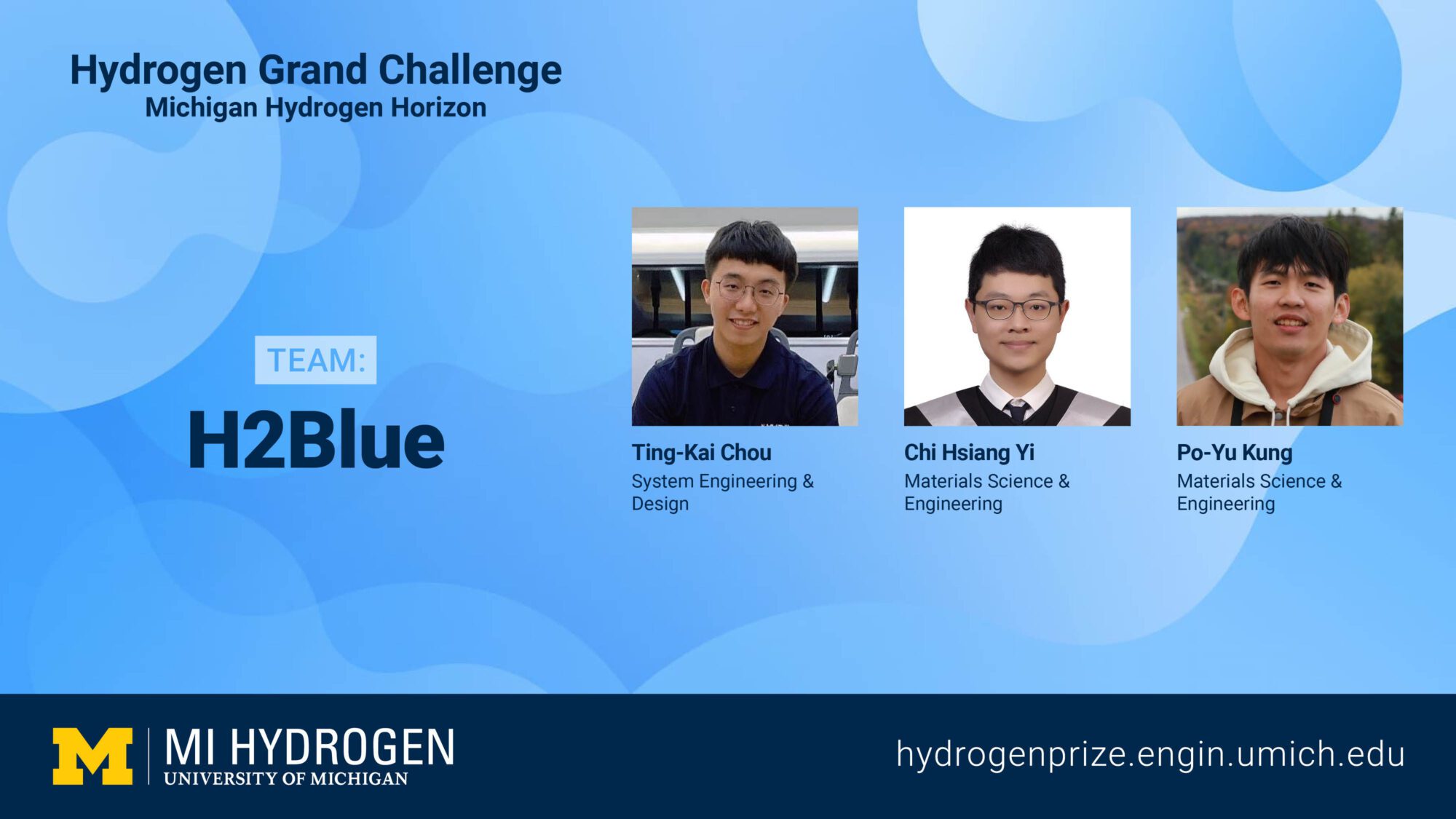
The Hydrogen Grand Challenge is a series of prize competitions organized by MI Hydrogen to accelerate the adoption of hydrogen as a clean and sustainable energy carrier, particularly in areas such as transportation and industrial applications, in order to facilitate an equitable, affordable, clean, and secure energy transition.
The first competition, Michigan Hydrogen Horizon, asked University of Michigan students to develop a business case for a Michigan-centered, regional deployment of hydrogen. The business case should demonstrate where clean hydrogen can add value to specific sectors and technology applications.
First Pitch was April 11, 2024
Learn more about the MI Hydrogen Grand Challenge
Research Collaboration and Funding Opportunities - 2/9/2024
Planning Hydrogen Ecosystem in Michigan: Truck Stop of the Future
MI Hydrogen Seminar Series: Michigan's Clean Hydrogen Future - 12/1/2023
Recent federal investments in hydrogen are intended to significantly accelerate timelines for the deployment of hydrogen technologies. States, in response, are working to align with stakeholders, establish individual strategies, and determine what this rapidly developing industry means for their residents and economies. Michigan, as a selectee for a Regional Clean Hydrogen hub, a leading member of the 7-state Midwest Hydrogen Coalition, and having recently secured significant investments from leading companies in the hydrogen supply chain, is well positioned to be a leader in the development of a national hydrogen economy. In this session, representatives from the Michigan Infrastructure Office will discuss the broad vision for hydrogen in Michigan, key projects and investments underway, and the challenges and opportunities facing the Great Lakes State.
Zachary Kolodin serves as Chief Infrastructure Officer and Director of the Michigan Infrastructure Office. He previously served as Governor Whitmer’s Public Policy Counsel. Before joining the Executive Office, he was an associate at Patterson Belknap Webb & Tyler LLP and served as a law clerk for U.S. District Judge Edward R. Korman. Kolodin also worked in the Office of Grants Policy and Operations at Americorps, and as a program administrator at the Roosevelt Institute, a New York City-based think tank. He is a graduate of Wesleyan University and New York University School of Law.
Kevin Mehren serves as the Deputy Infrastructure Officer for Clean Energy and the Environment within the Michigan Infrastructure Office. Prior to joining the office, Kevin held the role of Program Director with the Washington, D.C. based OurEnergyPolicy Foundation, which provides resources to support the creation of substantive and responsible energy policies. He is a graduate of Michigan State University and George Washington University’s Trachtenberg School of Public Policy and Public Administration.
MI Hydrogen Seminar Series: The Role of Hydrogen in Sustainable Transportation - 11/3/2023
Tim Wallington, Research Specialist, Center for Sustainable Systems, University of Michigan
Matt Collette, Professor, Naval Architecture and Marine Engineering, University of Michigan
Joaquim R. R. A. Martins, Pauline M. Sherman Collegiate Professor of Aerospace Engineering, University of Michigan
Abstract: Hydrogen produced by electrolysis using low-carbon electricity is widely viewed as an important future energy carrier in a decarbonized economy. There is strong federal policy support for increased hydrogen use. Hydrogen can be used directly or indirectly (via the production of e-fuels) in road, rail, air, and water transportation. In this seminar we will discuss the critical factors which will determine the future role of hydrogen in sustainable transportation.
Tim Wallington is a Research Specialist in the Center for Sustainable Systems and an Adjunct Professor in Climate and Space Sciences and Engineering at the University of Michigan. Tim has BA, MA, DPhil and DSc degrees from the University of Oxford, an MBA from the University of Michigan, and an Honorary Doctor of Science degree from Copenhagen University. His research
focus is transportation sustainability (vehicle energy use and emissions, air quality and climate change impacts, vehicle and fuel technoeconomic analyses and lifecycle assessments, material availability and flows, alternative fuels, social sustainability). He is a Fellow of the Royal Society of Chemistry and a member of the EPA Board of Scientific Counselors and the EPA Clean Air Act Advisory Committee.
Dr. Collette joined the University of Michigan in 2009, founding the Marine Structures Design Lab in the Department of Naval Architecture and Marine Engineering. His team focuses on two major themes: how to construct human-machine systems to sense, understand, and reason about vessels’ current health and capabilities and how to use numerical approaches to increase human understanding of design problems. His group focuses on structural systems, autonomous decision-making, and decarbonization's impact on ship design. He is the SNAME Functional Vice President for Education and past Chair of the International Ship Structures Congress Committee IV.1 on Design Principles and Criteria. He is a 1999 graduate of the Webb Institute with a B.S. in Naval Architecture and Marine Engineering and received his Ph.D. in Marine Technology from the University of Newcastle upon Tyne in 2005.
Joaquim R. R. A. Martins is the Pauline M. Sherman Collegiate Professor of Aerospace Engineering at the University of Michigan, where he heads the Multidisciplinary Design Optimization Laboratory. His research group develops MDO methods and applies them to the design of aircraft and other engineering systems. He is a co-author of "Engineering Design Optimization", a textbook published by Cambridge University Press. Prof. Martins is a Fellow of the American Institute of Aeronautics and Astronautics and a Fellow of the Royal Aeronautical Society. Before joining the University of Michigan faculty in 2009, he was an Associate Professor at the University of Toronto Institute for Aerospace Studies. From 2002, he held a Tier II Canada Research Chair in Multidisciplinary Optimization. He received his undergraduate degree in Aeronautical Engineering from Imperial College, London, with a British Aerospace Award. He obtained his M.Sc. and Ph.D. degrees from Stanford University, where he was awarded the Ballhaus prize for best thesis in the Department of Aeronautics and Astronautics. He has received the Best Paper Award at AIAA Conferences five times. He has served as Associate Editor for the AIAA Journal, Optimization and Engineering, and Structural and Multidisciplinary Optimization. He is currently an Associate Editor for the Journal of Aircraft.
An Introduction to Hydrogen: From Production to End Uses - 10/10/2023
Engineer/Analyst III
Low-Carbon Resources Initiative
Program Manager
Low-Carbon Resources Initiative
The Role of Hydrogen in Decarbonizing U.S. Industry - 10/6/2023
Value Propositions for Hydrogen - 9/8/2023

Ugi Otgonbaatar is Director, Technology Strategy, Grants & Partnerships, Constellation
The U.S. Hydrogen Demand Action Plan - 3/31/2023
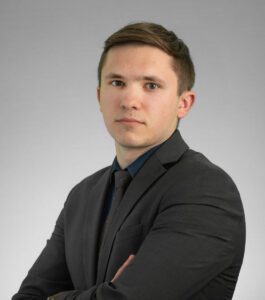
Alex Maranville is a Research Associate at the Energy Futures Initiative.
Supporting Sustainable Energy Decarbonization through Hydrogen - 3/17/2023

Dr. Vivek Sujan is a Distinguished Research Staff in the National Transportation Center at Oak Ridge National Laboratory
Supporting Transportation and Industry with Nuclear Energy with Richard Boardman - 3/10/2023

Dr. Richard Boardman is the Laboratory Relationship Manager in the Fuel Cell and Hydrogen Technology office at Idaho National Laboratory
Hydrogen-Powered Aircraft: Fundamental Concepts, Key Technologies, and Environmental Impacts with Joaquim R.R.A. Martins - 2/10/2023
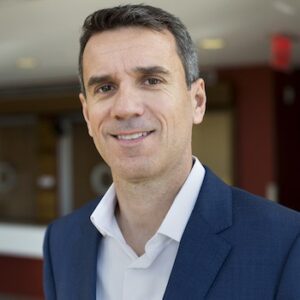
Dr. Joaquim Martins is the Pauline M. Sherman Collegiate Professor of Aerospace Engineering at the University of Michigan
Opportunities and Challenges for Hydrogen to Decarbonize Energy Sectors with Amgad Elgowainy, Ph.D. - 2/3/2023

Dr. Amgad Elgowainy is a senior scientist and distinguished fellow at Argonne National Laboratory
DOE National Clean Hydrogen Strategy and Roadmap with Marc Melaina, Ph.D. - 1/20/2023

Marc W. Melaina, Ph.D.
Senior Analyst
U.S. Department of Energy, Hydrogen and Fuel Cell Technologies Office
Boston Government Services (contractor)
Note: Dr. Melaina is one of the primary authors of the DOE National Clean Hydrogen Strategy and Roadmap report.
Hydrogen Safety and Reliability for Sustainable Mobility with Dr. Fatemeh Salehi - 1/5/2023

Dr. Fatemeh Salehi is an Associate Professor at the School of Engineering, Macquarie University, Australia.


